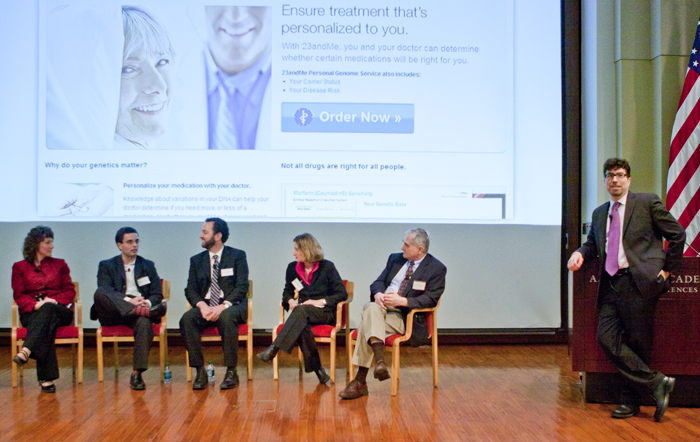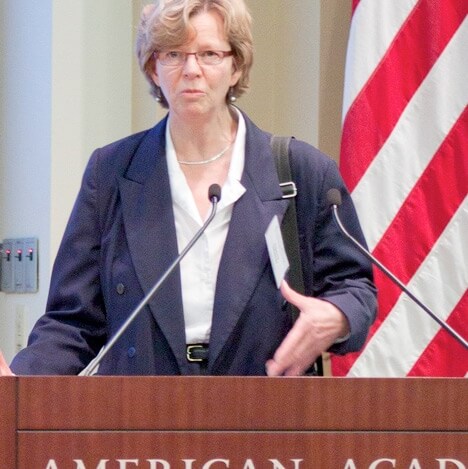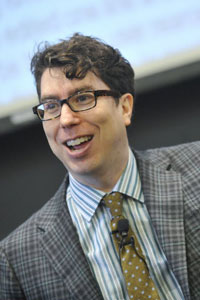News
Cherry A. Murray, Dean of the Harvard School of Engineering and Applied Sciences, delivers opening remarks at the American Academy of Arts and Sciences.

"Order Now," implores 23andMe.com, a provider of direct-to-consumer genetic testing. Left to right: Michelle Caggana, Dan Vorhaus, John Schumann, Gaia Bernstein, Art Beaudet, and moderator Jonathan Zittrain discuss individual rights to genetic information.
Cambridge, Mass. – April 20, 2011 - When five Texas parents found out in 2009 that the Department of State Health Services had saved DNA samples collected through its newborn screening program and was sharing them with researchers (and, as it turns out, federal investigators), they sued the state.
The complex case, involving healthcare policy, consent, medical research, forensics, and civil rights, exemplified the debate that is unfolding nationwide over privacy and autonomy in genetics.
The class-action lawsuit, which resulted in the incineration of more than 4 million blood samples, stirred a range of reactions among experts in medical ethics, law, public policy, research, and entrepreneurship during a symposium on “Privacy, Autonomy, and Personal Genetic Information in the Digital Age" held April 14.
Organized by Cherry A. Murray, Dean of the Harvard School of Engineering and Applied Sciences (SEAS), and co-hosted by the American Academy of Arts and Sciences in Cambridge, two panel discussions examined the “promise and perils” of creating digital repositories of genetic records and considered the policy implications of an individual’s right to access, control, and interpret his or her own genetic data.
The interdisciplinary event was held in conjunction with regional meetings of the National Academy of Engineering and Institute of Medicine and a Stated Meeting of the American Academy.
The first panel discussion, moderated by Jeffrey S. Flier, Dean of Harvard Medical School, examined the risks and benefits of crowdsourcing genetic data in the light of recent technological advances.
Within the last 10 years, the advent of high-speed, low-cost genetic sequencing methods has allowed the creation of services that provide genome sequencing and analysis directly to the public.
Through websites such as 23andMe.com, deCODEme.com, and Navigenics.com, anyone can provide a sample of saliva or blood and pay to have it screened for certain genetic traits—with varying levels of guidance (or none) from physicians or genetic counselors.
The results may be shared among participants, creating an online community that one panelist described as a “Facebook for genetics,” or among medical researchers who may benefit from the data trove as they attempt to understand the role of genetics in diseases like diabetes and cancer.
Healthcare providers, too, like those in Texas, are amassing records of genetic information alongside patients’ family medical history and epidemiological data.
Some experts believe genetic information needs a different level of protection than do healthcare records—perhaps more protection because it is inheritable and has greater implications for family members, or perhaps less protection because it represents only potential outcomes, rather than conditions actually made manifest.
The U.S. Food and Drug Administration regulates genetic testing as a diagnostic tool under the Federal Food, Drug, and Cosmetic Act, and individual states can enforce their own healthcare and privacy laws. New York state, for example, requires that genetic tests be ordered by a licensed medical practitioner. Additionally, the federal Genetic Information Nondiscrimination Act of 2008 prohibits discrimination in employment and health insurance on the basis of genetic makeup.
Even with such safeguards, though, genetic analysis and information privacy remain a "Wild West" for ethicists, legal experts, and policymakers.
Genetic altruists such as those who volunteer to participate in panelist George Church’s Personal Genome Project (PGP) do so because the data are essential for research into the causes and treatment of many diseases. For these early adopters of the technology, are certain risks inevitable?
Participants in PGP and the other sequencing services are required to sign consent forms (and, for PGP, pass an entrance exam), but the text of those consent forms, and the degree to which a signature might represent informed consent, vary between companies and healthcare providers, and across state lines.
“Can subjects ever truly be fully informed?” asked Flier, adding that a person signing a form today might be consenting to applications that “can’t even be imagined during the lifetime of the individual.”
“To what extent can one actually know the consequence of releasing that data?” asked Latanya Sweeney, an expert in digital privacy and a Visiting Professor at Harvard and MIT. “People have a horrible time calculating their risk of harm…. Historically, that’s been the role of privacy policy, because we’re often in that position.”
Church, Professor of Genetics at Harvard Medical School, suggested that with time and education, public familiarity with genetics will increase in the same way that people have learned to use computers and smartphones.
Hank Greely, Director of the Center for Law and the Biosciences at Stanford University, agreed that education is essential, warning against a “mismatch between public understanding and expectations—public knowledge—and scientific practice.”
“In research we have a relationship of trust with our participants, and that trust has to be based on a relationship with truth,” said Christine Patch, Chair of the British Society of Human Genetics. “I think it’s important that people don’t assume they have more privacy than they have.”
Referring back to the Texas case, Sweeney added, “Not to have the individual as a first-hand party to the decision making, allowing them control, is a formula for disaster."
The second panel discussion, moderated by Jonathan Zittrain, Professor at Harvard Law School, Harvard Kennedy School of Government, and SEAS, hinged on the definition of autonomy.
Zittrain asked whether an individual should have the right to obtain his or her own genetic information through a site like 23andMe.com without, for example, a prescription.
“I’m all for people being able to do it,” said John Schumann, Assistant Professor of Medicine and Faculty Associate of the MacLean Center for Medical Ethics at the University of Chicago, who is a practicing physician. To require medical guidance for such a test, he said, is “burdensome and very paternalistic.”
Zittrain, himself a participant in 23andMe, displayed one of his own test results at the front of the room: a higher-than-average risk of developing venous thromboembolism. He remarked that, knowing this, he was more likely to get up and stretch his legs during cross-country flights.
Results like that, or more simple ones like finding out the sex of an unborn child, may be relatively easy to interpret.
“Everybody understands what that means,” said Art Beaudet, Chair of the Department of Molecular and Human Genetics at Baylor College of Medicine. “But there may be other times when it’s a little more complex. You might be at risk of hemochromatosis. … Will you follow up on it, and will you understand it?”
“The idea is not to prevent people from making certain decisions,” said Gaia Bernstein, Professor of Law at Seton Hall University. “The idea is to give them more information so they can make more informed decisions. In my mind, this enhances their autonomy, not reduces it.”
As the allotted time ran out and the debate continued, Zittrain tapped the Academy’s podium and quipped, “It just shows it is appropriate to be in this building right now; this is as much art as science.”
Video of the event will be available online at http://academy.seas.harvard.edu within the coming weeks. Biographies of all 12 participants are also available.
Topics: Ethics, Computer Science, Awards
Cutting-edge science delivered direct to your inbox.
Join the Harvard SEAS mailing list.
Scientist Profiles
Jonathan Zittrain
George Bemis Professor of Law




